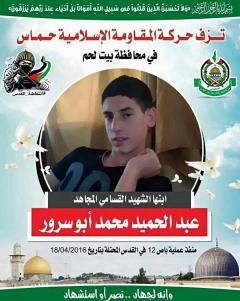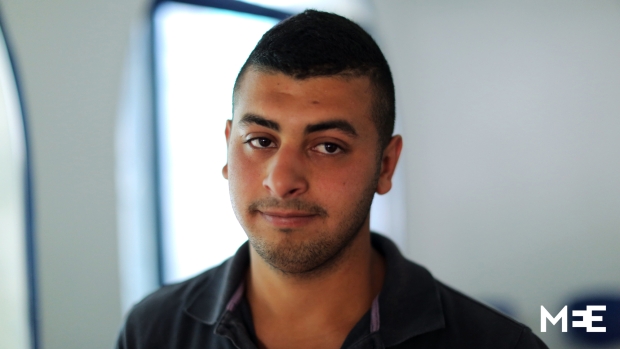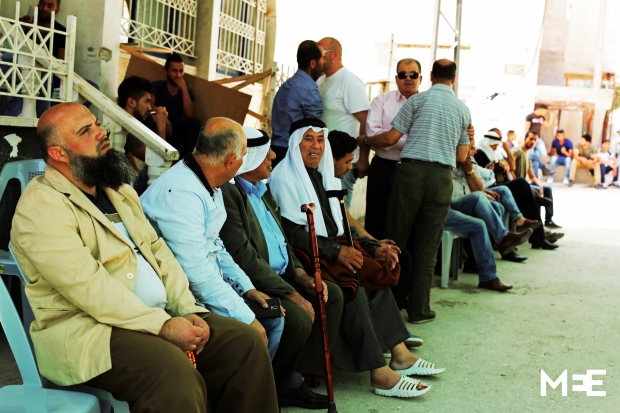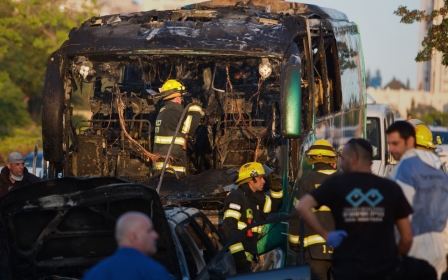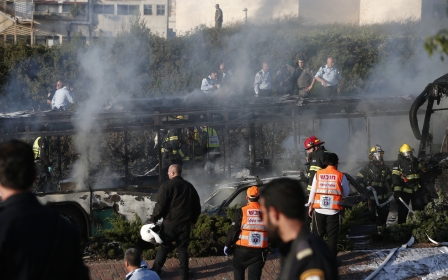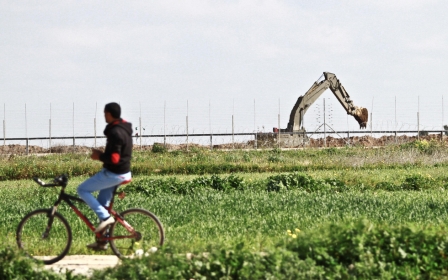'I never thought this would happen': Family of Jerusalem bus bomber speaks out
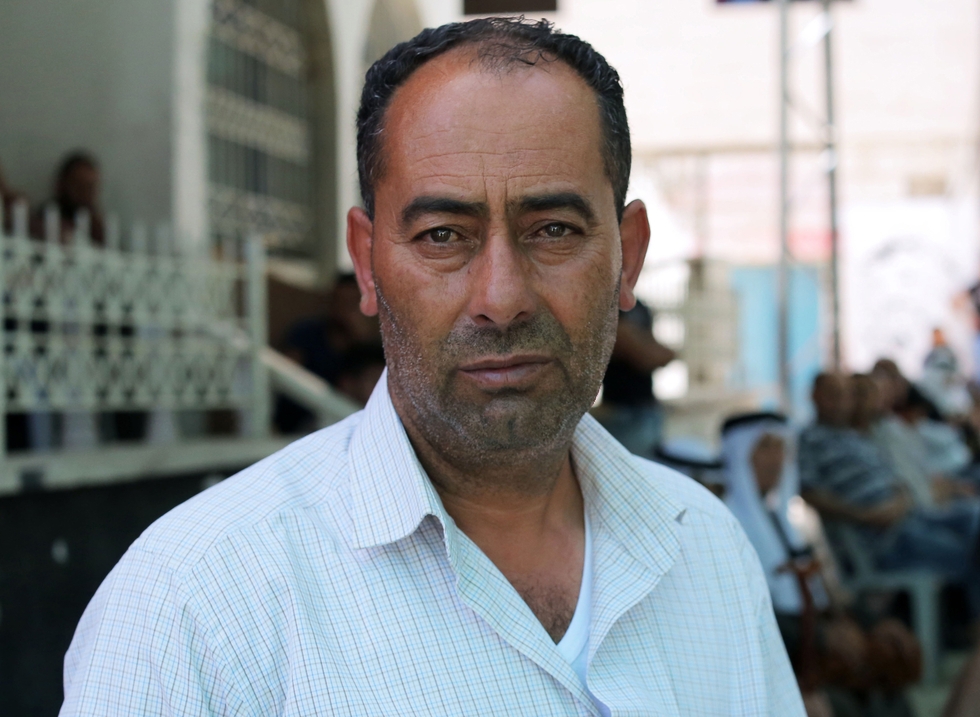
BETHLEHEM, West Bank - When fire engulfed a bus in Jerusalem on Monday, injuring at least 20 people, initial reports indicated that it might have been caused by a mechanical error. Hours later, however, it emerged that a bomb had in fact gone off, and by Wednesday 19-year-old Abd al-Hamid Abu Srour, a Palestinian from the West Bank, was identified as the suicide attacker.
Srour died of his wounds in hospital, leaving unanswered questions about why he carried out the attack and whether Hamas was behind the blast. The organisation’s West Bank branch claimed responsibility for the attack, calling Srour a “Hamas operative,” but the central Hamas movement in Gaza has remained silent.
Many of Srour’s family said they had no idea of his political affiliations and were shocked to find out that he could have done something like this.
Srour’s father, a furniture salesman, said he had no idea that his son was politically involved enough to be the operative in the bus bombing.
Mohammed said his son had just one more exam to take before he would have finished his high school studies. He described him as a great student and said that he was due to travel to Tunisia, where his older brother lives, to start a university veterinary degree this summer.
“Abd loved animals, he was a kind kid. I wanted him to be a regular doctor, but he insisted he wanted to study to help animals,” Mohammed said.
“School was very easy for him, but we noticed his grades dropping when things started to pick up here in October," referring to the latest upheaval to hit the occupied West Bank and Israel, starting more than six months ago. Since then, 200 Palestinians, mostly accused of being attackers but also some protesters, and about 30 Israelis have been killed. Mohammed said that the flare-up in violence had affected his son greatly.
“I could tell he stopped caring so much about school, he was distracted, but I never thought something like this would happen,” he said.
After the bus attack, Mohammed first noticed that something was amiss on Monday afternoon when his son did not come home. By evening, Mohammed was increasingly concerned, and the next morning, when his son still had not returned, he went to the Palestinian police. After visiting several police offices in Bethlehem city, he tried Israeli military checkpoint 300, Bethlehem city’s entrance and exit into Israeli territory.
“I thought I would go to check and see if he had been arrested by the Israelis. I never expected something like this. I mean, I heard about the bombing, of course, but it never crossed my mind that the bombing could be why my son wasn’t home,” Mohammed said.
By Tuesday evening, Mohammed had been through several Israeli interrogations and was told that his son was the main suspect in the Jerusalem bombing.
“After they were done questioning me, that’s when they took me to the hospital to identify him. I didn’t want to see, but they made me,” Mohammed said.
The dead young man's cousin and best friend, Srour Abu Srour, 18, said the teenager wasn't overly religious, nor did he seem more political than the rest of the young men in their circle.
Since 19-year-old Abd was identified as the Jerusalem bus bomber, Israeli forces have detained two of his friends for questioning.
“It was a shock to us when we heard the news, to all of us. I never thought about Abd doing something like that, it was really a shock,” Srour Abu Srour said.
“Abd prayed every day, but in a regular sort of way. He wasn’t overly religious at all,” he said.
Srour also said that his cousin did not have permission to enter Israel, and that he must have entered illegally to carry out the attack.
“I know he was good in school. I know he was excited about going to university in Tunisia. I know he was a good older brother. I know that every Tuesday our team got together to play football, but I don’t know about that stuff,” he said of the possible links to Hamas. “I’m shocked about the bus.”
Khalid Tafish, a Hamas official in the West Bank and a member of the Palestinian Legislative Council, told MEE that part of the reason for the secrecy is Hamas's pariah status in the West Bank, which is ruled by the rival Fatah movement.
“You must understand, since 2006 Hamas has not been able to operate in the West Bank,” he said, referring to the Fatah takeover of the West Bank and subsequent crackdown on Hamas. “Hamas operates out of the Gaza Strip.”
“We teach our operatives not to speak. I am a parliament member, not involved in these sort of matters, but I know that we teach our members not to speak to anyone about anything, even other Hamas members or family members,” Tafish said.
A wider trend has also emerged since the start of the latest upswing in violence, which has seen a surprising number of educated youths with seemingly promising futures and little or no known political affiliation carry out suicide attacks.
"A young man who is 20 years old, who is an activist, who goes to demonstrations, who is active in that kind of stuff, those kids don’t hold the anger that they have against the daily injustices and the occupation,” Kareem Amira, a youth leader at Aida refugee camp's Lagee Youth Centre said. “I would predict that an activist would be less likely to commit violent activity because they can express their feelings in different ways.
"Those youth who are not active in politics [also] have less of a chance of being under a spotlight for their work. If, for example, a person in the [refugee] camp who is not very involved in politics or activism disappears for a few days, people will not notice as quickly, or would not be suspicious of his whereabouts."
It is precisely these kinds of seemingly well-integrated and not overly political youths that recruiters prey on.
"If we assume that there is someone who is convincing and who is recruiting these youth to carry out militant or armed activity, it is easier for them to recruit a youth without a large network.
"It’s easier for these people to recruit a youth who does not have all these political connections because that helps to guarantee the safety of the mission, and guarantees that the youth will not speak about it with other people because they don’t have these political connections and friends."
New MEE newsletter: Jerusalem Dispatch
Sign up to get the latest insights and analysis on Israel-Palestine, alongside Turkey Unpacked and other MEE newsletters
Middle East Eye delivers independent and unrivalled coverage and analysis of the Middle East, North Africa and beyond. To learn more about republishing this content and the associated fees, please fill out this form. More about MEE can be found here.


